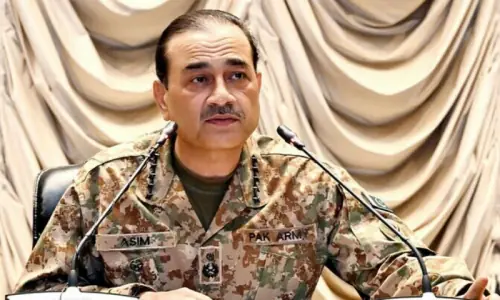ISLAMABAD: Ulema and representatives of various religious seminaries functioning under Wafaqul Madaris expressed concern on Monday over the “civil war-like situation” in the country and appealed to both the government and the Taliban to observe a “complete ceasefire” till the completion of the process of talks.
The appeal was made in a joint statement issued after a “consultative meeting” of the Ulema and teachers of seminaries held at a hotel. It was presided over by Wafaqul Madaris chief Maulana Salimullah Khan.
Abdul Quddoos, the spokesman for Wafaqul Madaris, a conglomerate of seminaries of Deobandi school of thought, said it was a routine “consultative meeting” to discuss the prevailing situation in the country and that was why the media had not been invited to cover the event or for a press briefing.
In reply to a question, he said the organisation wanted to play a mediatory role in the peace process, but at the same time it was mindful of the past when the establishment “used our shoulders, but ultimately did what it had already decided”.
Mr Quddoos recalled that Wafaqul Madaris played a mediatory role during the Lal Masjid episode in 2007 and later in Swat, but on both the occasions its efforts went in vain because of the use of military force. “This time we don’t want to put our reputation at stake.”
Moreover, he said, the organisation had no links with the Taliban. But he added that it would try to establish contacts with all “three stakeholders — the government, the army and the Taliban” — in an effort to know the real issues.
Mr Quddoos wondered if the United States could hold talks with the Afghan Taliban after indulging in a bloody war for 10 years, why the army and the government could not hold negotiations with those who belonged to Pakistan.
The participants of the meeting, who had come from different parts of the country, expressed sorrow over the loss of innocent lives in the recent incidents of terrorism. But at the same time they expressed satisfaction over the fact that the government and the Taliban had agreed to come to the negotiating table. It was the only way of resolving the issue, they observed.
The Ulema regretted that “some elements” were trying to sabotage the “peace process”.
“It is a matter of satisfaction for Ulema and Mashaikh that the government, the armed forces and the Tehrik-i-Taliban Pakistan all have agreed to end civil war in the country through negotiations,” the statement said.
“We appeal to the government of Pakistan, Tehrik-i-Taliban Pakistan and the country’s armed forces to observe ceasefire and not to indulge in any armed activity till the outcome of the talks.”
The meeting was attended by Mufti-i-Azam Pakistan Mufti Muhammad Rafi Usmani, Sheikhul Islam Maulana Mufti Muhammad Taqi Usmani, head of Jamia Uloomul Islamia Binnori Town Maulana Dr Abdul Razzaq Iskandar, Maulana Fazal Muhammad, Maulana Sher Ali Shah of Jamia Haqqania, spiritual leader from tribal areas Maulana Mufti Mukhtaruddin Shah, Mufti Syed Adnan Kakakhel and Mufti Abu Labab of Jamiatur Rasheed, Maulana Muhammad Hassan of Jamia Madina Lahore and Secretary General of Wafaqul Madaris Maulana Qari Muhammad Hanif Jalandhary.

































